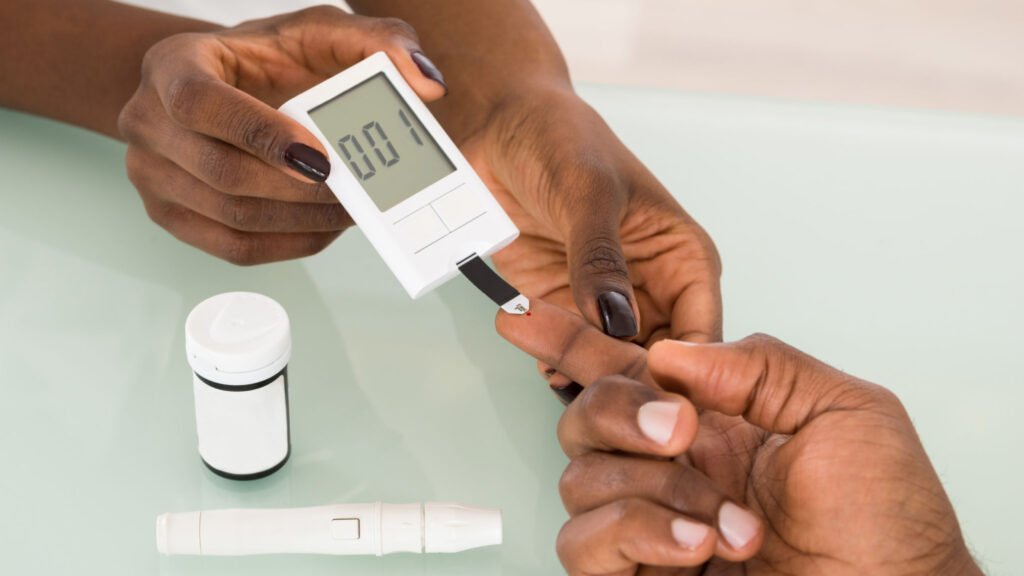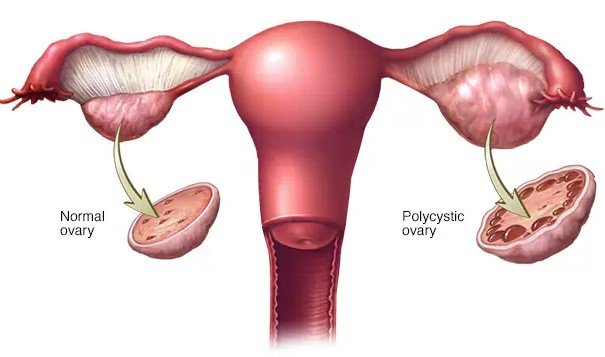
What is Polykystic ovarian syndrome (PCOS)?
Polycystic Ovarian Syndrome is a condition that affects how a woman’s ovaries work. It is defined by the presence of at least two of the following three features:
- Irregular periods: This can include infrequent periods or no periods at all.
- Excess androgen levels: This can lead to symptoms such as excess body or facial hair (hirsutism), acne, and male-pattern baldness.
- Polycystic ovaries: Ovaries that contain many small fluid-filled sacs (follicles) that fail to regularly release eggs.
PCOS affects a woman’s hormone levels, reproductive health, and metabolism, and it is associated with long-term risks like diabetes, cardiovascular diseases, and infertility.
Who is most affected by PCOS?
PCOS can affect women of all ethnic backgrounds, but certain groups may face unique challenges in diagnosis and treatment. In SSA, for example, limited access to healthcare and education about PCOS makes it difficult for many women to receive an accurate diagnosis and timely treatment.
The condition typically presents during a woman’s reproductive years, most commonly in her teens and 20s, though it can persist into later adulthood. The following women are most likely to benefit from understanding PCOS:
- Young women in their late teens and early 20s: These women often experience early symptoms such as irregular periods, weight gain, and acne, and may not be aware these symptoms are linked to a serious health condition.
- Women experiencing fertility issues: PCOS is a leading cause of infertility, so understanding the condition is critical for women who are struggling to conceive.
- Overweight or obese women: Although women of any body type can have PCOS, obesity is a common risk factor that worsens symptoms. In SSA, where obesity is on the rise, this group is particularly at risk.
What causes PCOS?
The exact cause of PCOS is unknown, but several factors are believed to contribute to its development:
- Genetics: PCOS tends to run in families, so if your mother or sister has PCOS, you may be more likely to develop it.
- Insulin resistance: Many women with PCOS have insulin resistance, meaning their bodies struggle to use insulin properly. This can lead to higher insulin levels, which may increase androgen production and make ovulation difficult.
- Hormonal imbalances: Increased levels of androgens (male hormones) interfere with the development and release of eggs from the ovaries, leading to irregular cycles and the characteristic “polycystic” appearance of the ovaries.
Causes of polykystic ovarian syndrome (PCOS)

Symptoms of PCOS
PCOS has a wide range of symptoms, and the severity can vary from one woman to another. Some women may experience only mild symptoms, while others have more pronounced signs. Key symptoms include:
- Irregular or absent menstrual periods: Some women with PCOS may have fewer than nine periods a year or go months without a period.
- Excess hair growth: Hirsutism, or unwanted hair on the face, chest, or back, is a common symptom.
- Acne and oily skin: PCOS can cause persistent acne, often on the face, chest, and upper back.
- Weight gain and difficulty losing weight: Many women with PCOS struggle with weight management.
- Thinning hair: Hair on the scalp may become thinner, while facial and body hair may increase.
- Fertility problems: PCOS is a leading cause of infertility due to irregular ovulation.
The many ways PCOS affects women
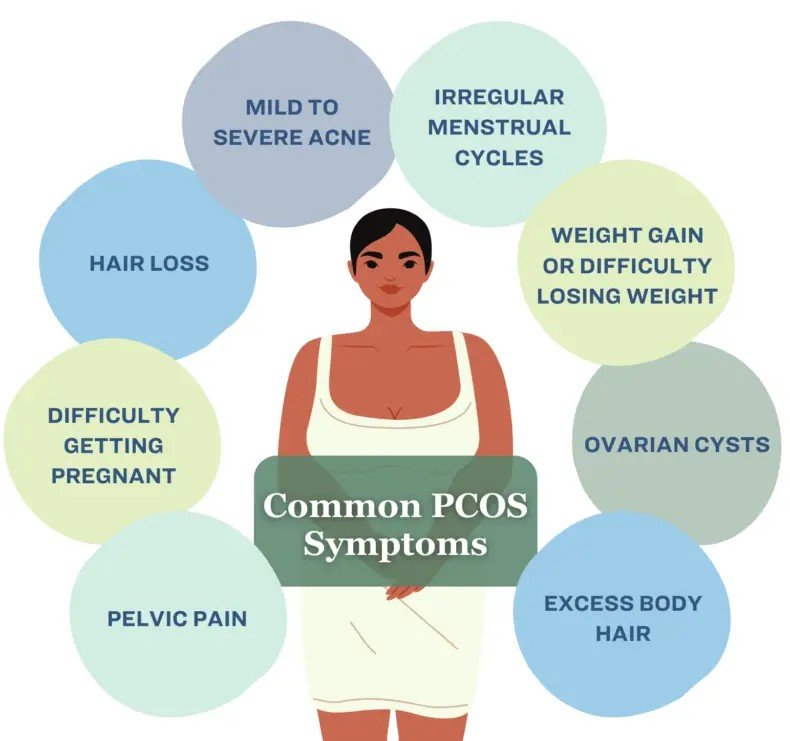
The long-term risk of PCOS
While PCOS is often considered a reproductive health issue, its effects can go beyond fertility. Women with PCOS are at increased risk for several long-term health conditions:
- Type 2 diabetes: Insulin resistance (often present in PCOS) can increase the risk of developing diabetes.
- Heart disease: PCOS is associated with risk factors such as high blood pressure, high cholesterol, and obesity, which can increase the likelihood of cardiovascular problems.
- Sleep apnea: Women with PCOS, especially those who are overweight, are more likely to develop sleep apnea, a condition where breathing stops for short periods during sleep.
- Endometrial cancer: Women with prolonged periods of missed ovulation may have a higher risk of developing endometrial cancer due to the buildup of the uterine lining.
The possible complications of PCOS – Over time
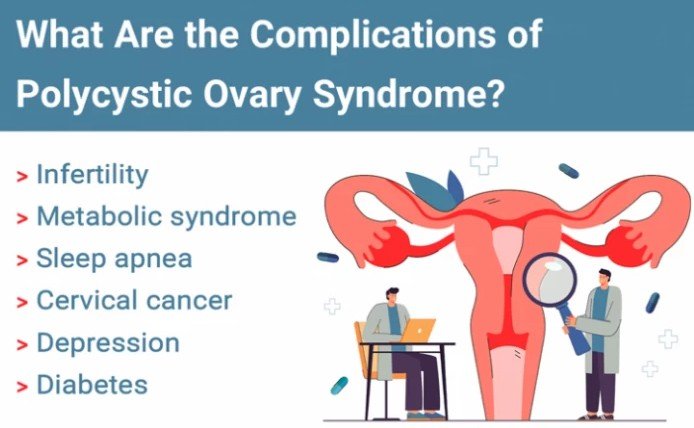
Diagnosis and treatment of PCOS
PCOS is diagnosed through a combination of medical history, physical examination, and tests, including hormone level tests and ultrasound scans to check the ovaries.
However, diagnosing PCOS can be challenging because the symptoms can vary and overlap with other conditions.
Treatment for PCOS typically focuses on managing the symptoms and reducing the risk of long-term health problems. Key treatment strategies include:
- Lifestyle changes: Weight loss through healthy eating and regular exercise can significantly improve symptoms and restore normal menstrual cycles.
- Medications: Birth control pills, anti-androgens, and medications to improve insulin sensitivity (such as metformin) are commonly used.
- Fertility treatments: For women trying to conceive, fertility treatments such as clomiphene or letrozole can help stimulate ovulation.
Summary of management options for PCOS
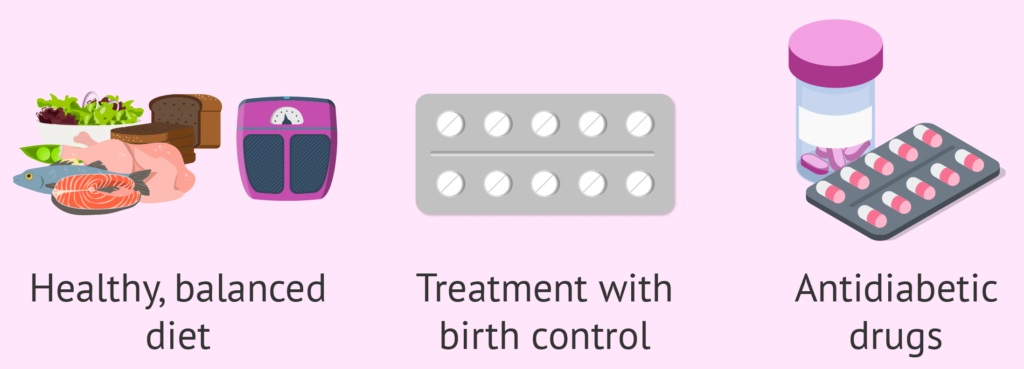
Dispelling misconceptions about PCOS
PCOS is often surrounded by myths and misunderstandings, particularly in regions where it is less well-known. Some common misconceptions include:
- “PCOS only affects overweight women”: While being overweight can worsen symptoms, PCOS can affect women of any body type.
- “PCOS always causes infertility”: Although PCOS can make it harder to conceive, many women with the condition are able to have children, especially with the right treatment.
- “PCOS is just a cosmetic problem”: While some symptoms, like excess hair growth or acne, are visible, PCOS is a serious health condition that affects metabolic and reproductive health.
Remember
Polycystic Ovarian Syndrome (PCOS) is a complex and often misunderstood condition that affects millions of women worldwide.
In SSA, where awareness and access to healthcare may be limited, it is especially important for women to be educated about PCOS, its symptoms, and available treatments.
By addressing PCOS early and making healthy lifestyle changes, women can reduce the long-term impact of this condition and improve their overall quality of life.

